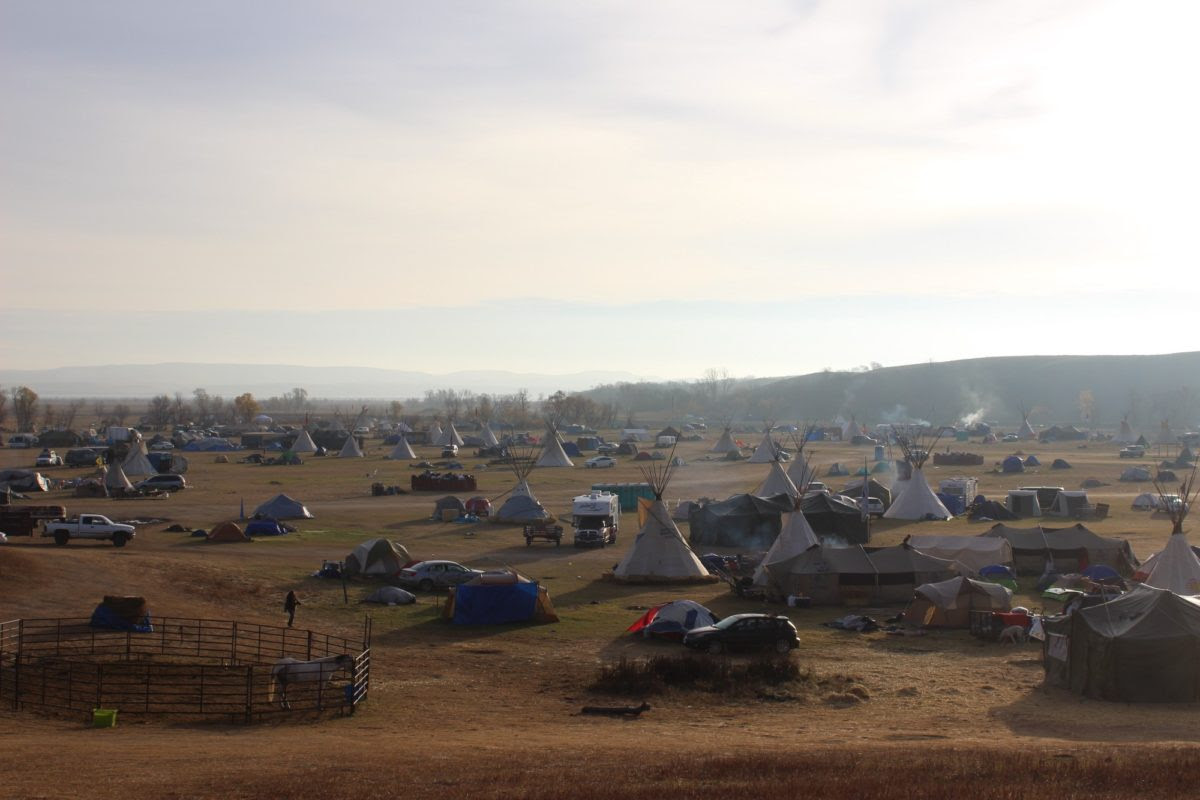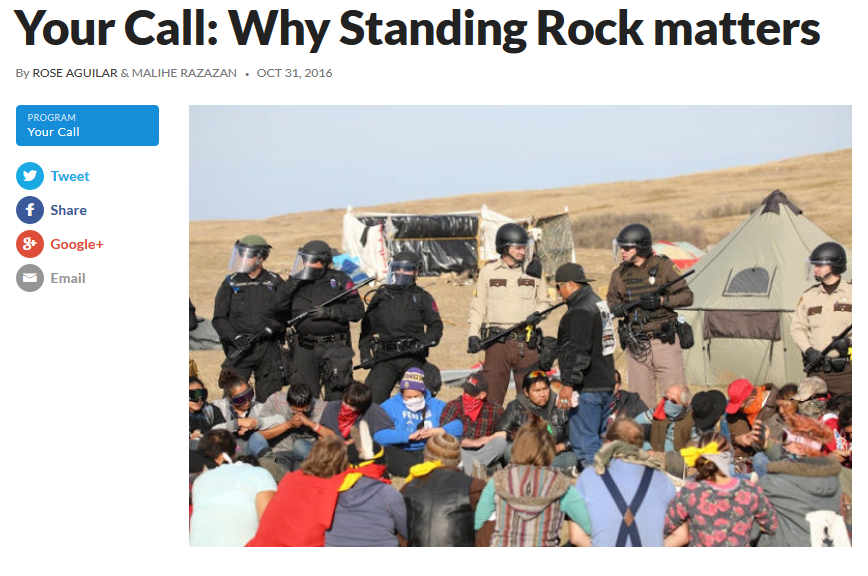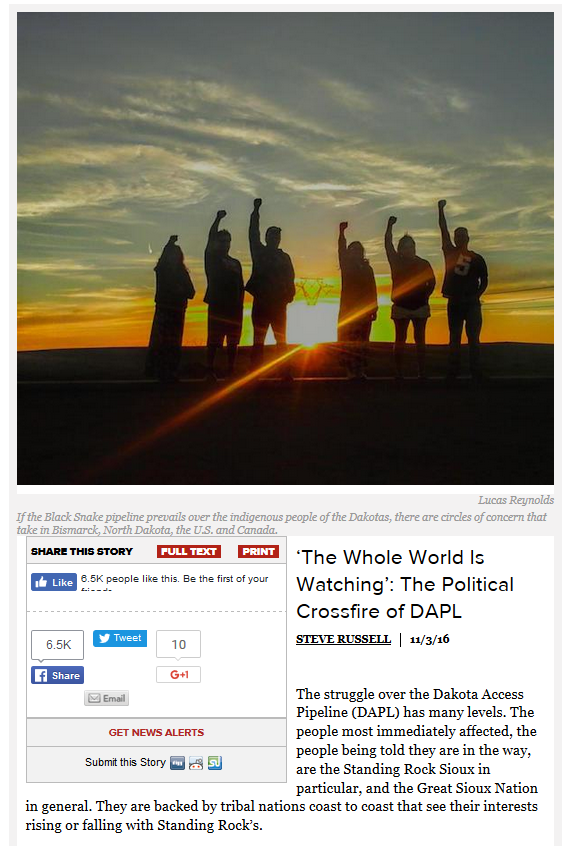Janine Jackson interviewed Rose Aguilar about reporting from Standing Rock for the November 4, 2016, episode of CounterSpin. This is a lightly edited transcript.

Rose Aguilar (photo: KALW)
Janine Jackson: What’s happening right now in North Dakota is reflective of many things: the violent desperation of extractive industry and the willingness of the state to act as its enforcers, counterposed with the peaceful power of people gathered in simple defense of the water, land and life of their community and the wider world.
The events around Standing Rock also seem to sound another death knell for corporate media as a site of critical news and debate, or of a vigorous defense for the right of people to stand up to power. If you’re following the fight around the Dakota Access Pipeline, you aren’t following it on the broadcast news.
Fortunately, we have non-corporate media who can bring us information about what’s going on, bring us the voices of the people involved. That, as we’ve seen,
they do this reporting at some risk only underscores its importance. We’re joined now by Rose Aguilar, host of
Your Call on
KALW, local public radio in San Francisco, and author of
Red Highways: A Journey Into the Heartland. She joins us now from North Dakota where she’s been gathering and sharing stories for days. Welcome back to
CounterSpin, Rose Aguilar.
Rose Aguilar: Hi, Janine. Thank you.
JJ: I guess I just want to ask you, what are some of the stories that you’ve been able to bring from North Dakota that you couldn’t have done from your office in San Francisco? What does it mean to be there?
RA: It just means so much. I was actually supposed to go home earlier this week, but I decided to stay because there are just so many rich stories to tell here. People are really frustrated and so shaken by last Thursday’s
violent crackdown, but they are determined. And I think it’s important to note that the pipeline, at this point, most of it has already been built, and the pipeline is being essentially protected by police and military vehicles.
So if you watched any of the videos of the actions in the last couple of months, what you saw were water protectors on the route of the pipeline preventing workers from getting to it. Workers were bussed in and then bussed out. And so the police cracked down really hard. They arrested over 100 people, and now that pipeline is literally being protected; the water protectors can no longer get to it.
So as you can imagine, people are so frustrated; they feel like the police are protecting Energy Transfer Partners — that’s the company that’s constructing the $3.8 billion Dakota Access oil pipeline. They’re very frustrated, because they say sacred sites are being bulldozed.
In fact, when you’re standing in the camp at night, it’s just thrown in your face, because there are really bright lights up on the hill, there’s a lot of Humvees, there’s ATVs that are crossing the land. In fact, I have interviewed people who were on the front lines praying, and as the police pushed them back last Thursday, the construction began immediately. So the construction was happening as people were being arrested.
JJ: Wow. And yet we hear that high-ups are saying, including Barack Obama, well, maybe it will be rerouted, maybe something will go differently. And yet it sounds as though it’s really kind of underway already.

Photo of the Oceti Sakowin Camp at Standing Rock by Pacific Standard‘s Antonia Juhasz
RA: Well, the construction is happening 24/7. What we’re talking about right now is a 20-mile section of the pipe that would go under the Missouri River, and that Missouri River provides drinking water to 18 million people. It’s the main source of water for the tribe, and I think this piece of information should be the lead in every story: An early proposal called for the pipeline to cross the Missouri River just north of Bismarck, which is the capital of North Dakota. That area is 90 percent white. But the route was rejected, because of a threat to Bismarck’s water supply. And then it was rerouted to basically go to the tribe’s doorstep.
Now, I’ve been trying to get answers to this question, why was it rerouted? I have left so many messages for Energy Transfer Partners, the governor of North Dakota, the Army Corps of Engineers, the Department of Justice. I cannot get an answer. Journalists need to be asking this question. The
Bismarck Tribune, which is the local paper here, has
reported that the route was rejected because of a threat to the water supply. But why is it not OK for one group of people, and it is OK for another group of people? And people here know this, they’re talking about this.
Talking about the human side, I think it’s really important for everyone to know that there are loads of cars and buses coming. People are flocking to Standing Rock because they want to express solidarity.
And I met yesterday Carol Masden, who’s a 69-year-old Native woman from Pennsylvania. She took a bus to Standing Rock. It took her three days to get here. She was on the front line praying, she was arrested, she spent three days in jail, including three hours in solitary for fist-bumping someone. She’s been camping for three weeks, and it’s cold here. She now has pneumonia. The police took her ID and her Medicare card. She still doesn’t have it, and in order, obviously, to get her meds, she needs those cards. She has been charged with a felony and has to stay here until December to make a court appearance.
She also said a DNA sample was taken. I have interviewed so many people who were arrested, charged with felonies, some strip-searched, others were made to take off their clothing and only have one layer of clothing, and they’re being asked for DNA samples. Now I finally, after two months of trying to get an interview with the sheriff’s department, I was finally able to speak with Rob Keller, the spokesman there, and when I said, why are people being tested, why are they giving DNA samples, he said, “I know nothing about that.”
So I’m going to look into this, because some people were told if you don’t give a sample, you’re going to get a second felony. But there’s this federal DNA database, and why are they taking DNA samples?
So there are a lot of questions that journalists need to be asking here. And come here and interview people. Every single day, there’s something happening.
I was driving to Bismarck to do my radio show, and I stumbled upon piles and piles of things that were taken from the front-line camps on Thursday, and the police just dumped it. And people here were crying because it included sacred items, like feathers and pipes.
And this is the kind of thing that’s happening, and you can only tell this story if you’re on the ground for, you know, more than two days. I mean, some people have flown in.
Sandy Tolan has done great reporting for the
LA Times, and
Antonia Juhasz has done great reporting for
Pacific Standard. But in order to really get the true sense of what’s happening, you have to stay for at least a week to get the real story.
JJ: And you would think that reporters would be curious, would be genuinely curious to see with their own eyes, and that we would see more of the big guys. But, fortunately, we have seen, it’s been a wonderful showing for independent media, or so-called alternative media, where people have been willing to go and listen to folks and bring those voices back.
You know, everybody’s in favor of protest, of dissent, when it’s abstract. But to actually take part in it is very, very different. You’re talking about people being pushed around, being put in solitary, having their things taken away, being sometimes strip-searched, giving DNA samples. It’s the treatment of people by law enforcement for what is, we understand, a protected activity, for peaceful protests, I think is really eye-opening. I think it should be alarming to people.
RA: It’s so true. And to see the photos of these MRAPs, these military vehicles, these men who look like they’re going to Iraq and Afghanistan. Antonia Juhasz has covered Afghanistan, and she was on the front line. She said, “I never thought I would see anything like this in the United States.” Now, when I spoke to Rob Keller with the Morton County sheriff’s department, he said that, yes, we are putting a call out to the rest of the country, to police departments, to come assist us. There are definitely more than five states represented.
And when you drive along 1806, the highway to get to the main camp, there’s a National Army Guard checkpoint. And right next to that, there’s a large law enforcement tent. Camp, really; there’s a ton of tents there. And that’s where the law enforcement are staying. And then you have to turn around and you have to take another highway. So Highway 1806 is being shut down today in order to have the pipeline protected.
And the media need to be asking questions about the militarization of these police forces. Is this the new norm in the United States? Who’s paying for this? How long is this pipeline going to be protected? Who is ultimately making these decisions? It’s been really hard to get answers to these questions. But if more journalists start asking them, then maybe we’ll get answers, and that’s what we need.
JJ: Listeners should know that it’s not just
Amy Goodman from
Democracy Now!, who was charged with rioting; it’s also documentary filmmakers
Deia Schlosberg and
Lindsey Goodwin-Grayzel,
four journalists with the independent news outlet
Unicorn Riot…. This
piece that I read by Sabrina King of the ACLU of Wyoming reminds us that five protesters who were part of an action, a different action, that temporarily shut down five pipelines carrying Canadian tar sands oil, one of them is facing 81 years in prison —
RA: Wow.
JJ: — and nearly $100,000 in fines for nonviolent actions in which no one was hurt. So I wonder, truly, if some reporters aren’t, frankly, intimidated by the thought of doing journalism here.
RA: That could be the case, because look at how people are treated. And if you have a felony on your record, I mean, that is a serious, serious charge.
The other thing, Janine, is when you come here, a lot of Natives are afraid to talk, because of the way they’ve been treated. I met a woman yesterday who would not let me state her name publicly or take a photo. She said, “I’m afraid that my children are in danger if I talk about what happened to me.” And so in order to get the real story, you’ve got to create relationships. You have to stay here, you have to get to know people, then they introduce you to other people. And it’s so important to get the Native voices. What I’m finding is some of the videos I’ve been seeing from some of these independent outlets—and they’re doing great work—but it’s starting to be sort of majority white.
And I think it’s so important, when journalists come here, to go to extra lengths to be sure to get the Native voices. And sometimes it’s hard, because they don’t want to talk, they don’t want to be filmed, and you can understand why. But that’s why it’s important to actually spend time here and create relationships.
And you mentioned journalism, and I also just want to give a shout out to the Native media. Like
Indian Country Today has been doing excellent reporting, and they offer crucial
historical context about treaties, for example.
I mean, this is a time when we all should be educating ourselves about the history of this country and about broken treaties. A lot of people I’ve met here say, look, this is not about what happened 500 years ago. We want people to know that and learn that. This is about what they’re doing to us today. We are being arrested for praying today. They’re breaking our pipes today. And while we’re here to fight for water, this is about so much more. It’s about embracing a different way of life, because the path that we’re on now is just not sustainable.
JJ: I want to just ask you, finally, what is the feeling like? I understand that people are frustrated and frightened in reaction to the circumstances. But what is the mood in the gatherings that you’ve been at?
RA: Ah, so many. I was at one of the nearby hotels where people are coming to shower, because there’s no shower at the camp. People are camping in the cold weather. And I passed two young women who were just maced at a recent action. They were covered in white, their hair was all tangled, visibly shaken up. So you’ve got that.
But then you also have prayer circles. At night, people sit around the fire and the elders speak about their lives, about the importance of this movement. And then you have flags from so many different tribes across the country. There are members of about 300 different tribal nations who are here or have been here. So you see that.
And then just the everyday conversations. Young people coming from nearby reservations so their brothers find purpose. Older people coming to connect with people from other tribes.
I met a member of the American Indian Movement a couple days ago. He was heavily involved back in the ‘70s. He started crying and saying: “We have had so much conflict within our tribe. This is the first time that these seven specific different tribes have gotten together. We put all of that behind us and now we are here together, we’re basically holding hands, we’re praying together for the first time.”
So you also get that side of it. And that’s why it’s so important for journalists to come here and tell these stories.
JJ: We’ve been speaking with Rose Aguilar. She’s host of
Your Call. You can hear it
online at
KALW.org. Rose Aguilar, thank you so much for joining us this week on
CounterSpin.
RA: Thanks, Janine. Thank you for covering this.
Read the original post here. 




